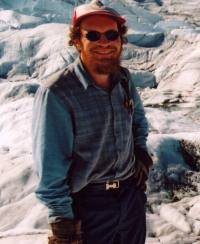S.T. Lee Lecture 2008

Through a crevasse darkly: An update on the future of the Antarctic ice sheet
Professor Richard Alley (via Live Video-Link), 20 May 2008
Evan Pugh Professor of Geosciences, The Pennsylvania State University, United States
Synopsis of lecture
Recent rapid changes have dispelled the comfortable view of a coldly aloof Antarctic ice sheet largely ignoring changes in its surroundings. Many new discoveries show that elements of Antarctic ice cover are surprisingly sensitive to warming and could accelerate sea-level rise. Even slight warming of water beneath ice shelves can speed ice flow to the ocean, as can puddling of meltwater on top of ice shelves to wedge open crevasses. In the warmer distant past tens of millions of years ago the whole ice sheet was smaller and more dynamic, but even as recently as 3-5 million years ago new geological records indicate a notable reduction or disappearance of the smaller West Antarctic Ice Sheet when global average temperature was only 2-3ºC warmer than today. Yet, translating these new results into useful predictions remains difficult, with no consensus on whether future changes in the ice sheet will be fast enough to matter to modern policymakers. In the words of the IPCC "...understanding...is too limited to...provide a best estimate or an upper bound for sea level rise". Fortunately, that understanding is coming, and useful projections may become possible soon.
The lecture was followed by a panel discussion led by:
- Prof Peter Barrett—Antarctic Research Centre and New Zealand Climate Change Research Institute
Panels members included:
- Dr Nancy Bertler—Antarctic Research Centre
- Prof Jonathan Boston—Institute of Policy Studies
- Dr Andrew Mackintosh—School of Geography, Environment and Earth Sciences
- Prof Martin Manning—New Zealand Climate Change Research Institute
Richard Alley
Richard Alley is Evan Pugh Professor of Geosciences at The Pennsylvania State University, where he has worked since 1988. He teaches and conducts research on the climatic records, flow behaviour, and sedimentary deposits of large ice sheets, notably Greenland and Antarctica. He has authored over 170 refereed scientific publications, and has been particularly successful in advancing understanding of the behaviour of ice sheets, glaciers and ice shelves. His scientific awards include the Revelle Medal of the American Geophysical Union and Fellowship in the Union and the first Agassiz Medal of the European Geosciences Union. Richard is very candid about the many unknowns concerning global warming and its effects, earning him respect from those on both sides of the issue. He has appeared in numerous television documentaries on climate change and has given many public presentations and media interviews about the subject. His popular account of climate change and ice cores, The Two-Mile Time Machine, was chosen science book of the year by Phi Beta Kappa in 2001. Richard has served on a variety of advisory panels and steering committees, and has been either a contributing or lead author for the last three Assessment Reports of the UN Intergovernmental Panel on Climate Change (1995, 2001, 2007).
